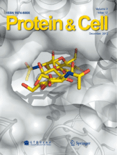
AMINO ACIDS
Scope & Guideline
Where Biochemistry Meets Innovation
Introduction
Aims and Scopes
- Biochemical and Metabolic Functions of Amino Acids:
Research focusing on the biochemical pathways and metabolic roles of amino acids, including their involvement in protein synthesis, energy metabolism, and signaling pathways. - Amino Acids in Health and Disease:
Exploration of the implications of amino acids in various health conditions, including metabolic disorders, cancer, and neurodegenerative diseases, highlighting their potential as biomarkers and therapeutic targets. - Innovations in Amino Acid Analysis and Profiling:
Development and application of novel analytical techniques for amino acid profiling, metabolomics, and post-translational modifications, facilitating a deeper understanding of their biological significance. - Therapeutic Applications of Amino Acids and Peptides:
Studies investigating the therapeutic potential of amino acids and peptides in clinical settings, including their roles in drug design, supplementation, and disease management. - Amino Acids in Nutrition and Dietary Studies:
Research into dietary sources of amino acids, their nutritional implications, and their effects on health outcomes, particularly in specific populations such as children and athletes.
Trending and Emerging
- Metabolomics and Biomarker Discovery:
There is an increased emphasis on metabolomic profiling of amino acids as diagnostic tools for various diseases, including cancer and metabolic disorders, underscoring the importance of amino acid metabolism in health. - Amino Acids in Immune Response and Inflammation:
Research exploring the role of amino acids in modulating immune responses and inflammation is gaining traction, particularly in the context of chronic diseases and infection. - Peptide Therapeutics and Drug Development:
The development of peptide-based therapeutics, including their design and application in treating various diseases, is emerging as a significant area of interest, reflecting the growing recognition of peptides as viable therapeutic agents. - Amino Acids and Gut Microbiota Interactions:
An emerging focus on the interactions between amino acids and gut microbiota is evident, highlighting their combined influence on metabolism and health, particularly in relation to obesity and metabolic syndrome. - Personalized Nutrition and Amino Acid Metabolism:
There is a growing trend towards personalized nutrition strategies that consider individual variations in amino acid metabolism and requirements, particularly in relation to exercise and health optimization.
Declining or Waning
- Amino Acids in Plant Biology:
Research exploring the role of amino acids in plant physiology and development has seen a notable decline, possibly due to shifting interests towards genetic and molecular studies in plant sciences. - Traditional Protein Supplementation Studies:
The focus on traditional protein supplementation in sports and nutrition appears to be waning, as newer research emphasizes metabolomics and personalized nutrition approaches. - Basic Amino Acid Chemistry:
Basic research on the chemical properties and synthesis of amino acids is becoming less prevalent, with a shift towards more applied and clinical research topics.
Similar Journals

Doklady Biochemistry and Biophysics
Connecting Researchers through Innovative Biochemistry and Biophysics InsightsDoklady Biochemistry and Biophysics is a vital resource for the advancement of knowledge in the fields of biochemistry and biophysics, published by MAIK NAUKA/INTERPERIODICA/SPRINGER. Featuring an ISSN of 1607-6729 and an E-ISSN of 1608-3091, this journal plays a critical role in disseminating research findings and fostering scholarly discourse. Despite its recent ranking in the Q4 quartile for biochemistry and biophysics in 2023, it serves as an essential platform for researchers exploring these intertwined disciplines. The journal’s scope encompasses a wide variety of topics, enhancing the understanding of biochemical processes and physical principles in biological systems. With converged years of publication from 2001 to 2024, it stands as a continual source of knowledge for its readers, who include researchers, professionals, and students alike. While the journal currently does not offer open access options, its contributions remain significant within the scholarly community, illustrated by its competitive Scopus rankings across related fields.

Protein & Cell
Fostering Global Knowledge Exchange in Biochemical ResearchProtein & Cell, published by Oxford University Press, is a distinguished international journal focusing on cutting-edge research in the fields of biochemistry, biotechnology, cell biology, and drug discovery. This open access journal, active since 2014, is dedicated to disseminating innovative findings that advance our understanding of protein functions and cellular processes, making it an essential resource for researchers, professionals, and students alike. With an impressive 2023 impact factor reflected in its Q1 ranking across multiple categories such as Biochemistry, Drug Discovery, and Cell Biology, 'Protein & Cell' stands at the forefront of scientific research, driving collaboration and discussion in the scientific community. Researchers can access the journal freely online, fostering a global exchange of knowledge and contributing to significant advancements in medicine and biotechnology. Located in the United Kingdom, the journal strives to be a pivotal platform for impactful research that influences future studies and applications.

TRENDS IN BIOCHEMICAL SCIENCES
Navigating the Evolving Landscape of BiochemistryTRENDS IN BIOCHEMICAL SCIENCES is a premier academic journal published by CELL PRESS, focusing on the latest advancements and insights in the dynamic fields of biochemistry and molecular biology. With an ISSN of 0968-0004 and an E-ISSN of 1362-4326, this journal has established itself as a leading source of high-impact research, boasting an impressive Q1 category ranking in both Biochemistry and Molecular Biology as of 2023. The journal's Scopus Ranks further highlight its significance, placing it in the top 3% and 4% of its respective fields, emphasizing its role as a vital platform for disseminating innovative research. Published since 1976 and continuing through 2024, TRENDS IN BIOCHEMICAL SCIENCES provides a comprehensive overview of the latest trends, methods, and applications, helping researchers, professionals, and students stay at the forefront of their disciplines. Although it offers traditional access options, the journal's rich content and authoritative analysis make it a must-read for those pursuing cutting-edge biochemical research.

Journal of Biochemistry
Pioneering research in biochemistry and beyond.Journal of Biochemistry, published by Oxford University Press, is a prestigious academic journal that has been at the forefront of biochemical research since its inception in 1922. With an ISSN of 0021-924X and an E-ISSN of 1756-2651, this journal serves as a platform for disseminating high-quality research in the fields of biochemistry, molecular biology, and medicine, holding impressive rankings such as Q2 in Biochemistry and Medicine (miscellaneous) in 2023. As of 2024, the journal continues to explore significant topics in these areas, offering valuable insights for researchers, professionals, and students alike. The journal does not currently offer open access, but it remains a vital resource for anyone in the biochemical community seeking to stay updated on the latest discoveries and advancements. With its rich history and dedication to scientific excellence, the Journal of Biochemistry is an indispensable part of the scholarly landscape.

Frontiers in Nutrition
Connecting research and application in the field of nutrition.Frontiers in Nutrition, published by FRONTIERS MEDIA SA, is a leading open access journal dedicated to advancing the field of nutrition through rigorous research and innovative insights. Since its inception in 2014, it has established itself as a key resource for researchers, healthcare professionals, and policymakers interested in the multidimensional aspects of nutrition and its impact on health and disease. The journal boasts a commendable reputation with a quartile ranking of Q1 in Food Science and multiple Q2 rankings in Endocrinology, Diabetes and Metabolism, as well as Nutrition and Dietetics, reflecting its high-quality contributions to the scientific community. With an accessible platform that ensures the wide dissemination of knowledge, Frontiers in Nutrition is committed to fostering collaboration among experts and promoting findings that can lead to healthier populations worldwide. The journal encourages submissions that address the complex interplay between nutrition and health, thus bridging the gap between research and practical application. Join us in exploring how nutrition can enhance well-being and address global health challenges.

JOURNAL OF BIOLOGICAL CHEMISTRY
Shaping the Future of Biological SciencesJOURNAL OF BIOLOGICAL CHEMISTRY, published by Elsevier, is a premier interdisciplinary journal dedicated to advancing our understanding of biochemistry, cell biology, and molecular biology. With a prestigious history dating back to 1945 and an impressive convergence of research expected to continue through 2024, this journal holds a Q1 ranking in all three of its core categories, signaling its critical influence in the respective fields, supported by a robust Scopus ranking that places it among the top echelons of internationally recognized research. Although currently not available as Open Access, the journal is essential for researchers and professionals looking to stay abreast of the latest breakthroughs and innovations in biochemical research. With a deep commitment to scientific rigor and a focus on diverse topics ranging from cellular processes to molecular mechanisms, the Journal of Biological Chemistry serves as a vital resource for the academic community, shaping the future of biological sciences.

CURRENT PROTEIN & PEPTIDE SCIENCE
Connecting Disciplines: Biochemistry, Cell Biology, and BeyondCURRENT PROTEIN & PEPTIDE SCIENCE, published by Bentham Science Publishers, is a pivotal journal dedicated to the dynamic and rapidly evolving fields of protein and peptide research. With an ISSN of 1389-2037 and an E-ISSN of 1875-5550, this esteemed journal serves as a platform for disseminating cutting-edge findings from various disciplines, including biochemistry, cell biology, and molecular biology. Recognized for its influence with a 2023 Scopus ranking placing it within the top quartiles of its categories—Q3 in Biochemistry, Q4 in Cell Biology, and Q2 in Medicine—the journal not only enhances the visibility of critical research but also supports the academic community in advancing our understanding of the molecular foundations of life. Established in 2000 and running through 2024, CURRENT PROTEIN & PEPTIDE SCIENCE is positioned to cater to the interests of researchers, professionals, and students alike, providing them with open access to vital knowledge that fuels innovation and scientific inquiry in the United Arab Emirates and beyond.

CRITICAL REVIEWS IN BIOCHEMISTRY AND MOLECULAR BIOLOGY
Unveiling Critical Perspectives in BiochemistryWelcome to Critical Reviews in Biochemistry and Molecular Biology, a premier academic journal published by Taylor & Francis Ltd, dedicated to advancing the fields of biochemistry and molecular biology. With an impressive impact factor and a Q1 ranking in both Biochemistry and Molecular Biology for 2023, this journal serves as a vital resource for researchers, professionals, and students eager to engage with cutting-edge reviews and analyses that synthesize the latest developments in these dynamic areas of study. Since its inception in 1972, the journal has maintained a commitment to high-quality scholarship, providing a platform for critical discussions that accelerate the discovery and understanding of biochemical processes and molecular interactions. Although not open access, its robust editorial peer-review process ensures that published articles meet the highest standards of scientific rigor, making it a trusted source for the scientific community. As we continue to converge toward 2024, we invite you to explore the extensive array of topics and findings that have shaped contemporary biochemistry and molecular biology.

BIOCHIMIE
Pioneering Research for Tomorrow's Health SolutionsWelcome to BIOCHIMIE, a prestigious journal dedicated to advancing the field of biochemistry and related areas of medicine. Published by Elsevier France - Editions Scientifiques Medicales Elsevier, this journal has been a cornerstone of scientific communication since its inception in 1971 and will continue to contribute essential research until 2024. With an impressive impact factor and categorized in Q2 for Biochemistry and Q1 for Miscellaneous Medicine, BIOCHIMIE ranks among the top quartiles in its fields, underscoring its significance and influence in the scientific community. Targeting a wide audience of researchers, professionals, and students, the journal publishes high-quality articles that explore innovative research and developments in biochemistry, genetics, and molecular biology, reflected in its Scopus ranking of 136 out of 438 in the biochemistry category. Despite its traditional publication format, the journal remains committed to promoting impactful research that drives the future of biochemistry and molecular medicine, ensuring that readers have access to critical insights that foster advancements in health and science.

Biochemistry and Cell Biology
Shaping the future of biochemistry and cell biology through shared insights.Biochemistry and Cell Biology, published by Canadian Science Publishing, is a prestigious journal that has been instrumental in advancing the fields of biochemistry, molecular biology, and cell biology since its inception in 1986. With an impressive scope spanning innovative research findings to comprehensive reviews, this journal serves as a vital resource for researchers, professionals, and students alike. Currently positioned in the Q2 quartile in Biochemistry and Q3 quartiles in both Cell Biology and Molecular Biology, it reflects a robust contribution to scientific discourse, placing it among reputable publications in its field. The journal boasts notable rankings within the Scopus database, highlighting its impact and relevance, and continues to be a valuable platform for disseminating pivotal research. By providing access to a wide array of articles, the journal remains committed to fostering knowledge and collaboration in the scientific community.